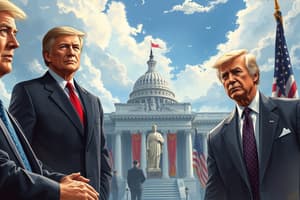Podcast
Questions and Answers
The President can declare war without Congressional approval.
The President can declare war without Congressional approval.
False (B)
The President is required to disclose all information to Congress without exception.
The President is required to disclose all information to Congress without exception.
False (B)
The role of the vice-president has remained unchanged since the early 1990s.
The role of the vice-president has remained unchanged since the early 1990s.
False (B)
All Presidents have been elected to either the Presidency or the vice-Presidency.
All Presidents have been elected to either the Presidency or the vice-Presidency.
The President of the United States has one of the highest salaries among all Americans.
The President of the United States has one of the highest salaries among all Americans.
No President has served more than two terms in office.
No President has served more than two terms in office.
The 22nd Amendment limits the President to two terms.
The 22nd Amendment limits the President to two terms.
The President has the responsibility to conduct U.S. foreign policy.
The President has the responsibility to conduct U.S. foreign policy.
Flashcards
What is the role of the President as Chief Executive?
What is the role of the President as Chief Executive?
The President is the head of the US government, responsible for executing laws and leading the nation.
What is the role of the President as Chief of State?
What is the role of the President as Chief of State?
The President represents the US at formal events and ceremonies, acting as a symbol of the nation.
What is the role of the President as Chief Diplomat?
What is the role of the President as Chief Diplomat?
The President directs US foreign policy, dealing with other countries and signing international agreements.
What is the role of the President as Commander-in-Chief?
What is the role of the President as Commander-in-Chief?
Signup and view all the flashcards
What is the two-term limit on the Presidency?
What is the two-term limit on the Presidency?
Signup and view all the flashcards
What are the eligibility requirements for the presidency?
What are the eligibility requirements for the presidency?
Signup and view all the flashcards
Can the President withhold information from Congress?
Can the President withhold information from Congress?
Signup and view all the flashcards
How is the President elected?
How is the President elected?
Signup and view all the flashcards
Study Notes
Presidential Roles
- The President's role is multifaceted.
- Congress declares war, not the President.
- The President can withhold information from Congress if they believe it endangers America
- The Vice President's power has been increasing since the 1990s.
- No president has ever attained the highest office without being elected President or Vice President.
- The president is a high-paid member of society, earning $400,000.
- No president can be elected more than twice.
- Franklin D. Roosevelt was the only president to be elected four times.
- George Washington set the precedent for a two-term limit.
- The 22nd Amendment made this a law in 1951.
Presidency Requirements
- The president is elected to a four-year term by the Electoral College.
- The 22nd Amendment imposes a two-term limit on the presidency.
- A president must be 35 years old, a 14-year resident, and a natural born citizen.
Role: Chief of State
- The President acts as a symbol of the United States and figurehead.
- The President represents America at ceremonies and special occasions.
- The president awards medals and gives speeches.
Role: Chief Executive
- The President is the head of the 15 executive departments.
- These departments help the President enforce, carry out, or execute laws.
- The president chooses cabinet members (approved by Congress) to advise him.
- Cabinet meetings and appointing federal officials are key parts of the role.
Role: Chief Diplomat
- The President handles the foreign policy of the US.
- The President directs American ambassadors.
- The President signs treaties and trade agreements with foreign leaders.
Role: Commander-in-Chief
- The President is in charge of the US Armed Forces.
- The President decides where forces go and what weapons to use.
- The Chairman of the Joint Chiefs is the top military commander under the President.
Role: Chief Legislator
- The President proposes bills and signs them into law.
- The President urges Congress to support their agenda.
- The President presents their agenda in the State of the Union address.
Role: Chief of Party
- The President aids members of their party in getting elected or appointed.
- The President gives campaign speeches needed for re-election.
- The President leads fund-raising for their party.
Role: Chief Guardian of the Economy
- The President monitors unemployment, inflation, taxation, business, and the general welfare of the nation.
- The President does not control the economy, but receives credit for a thriving economy and blamed for a poor one.
Studying That Suits You
Use AI to generate personalized quizzes and flashcards to suit your learning preferences.




